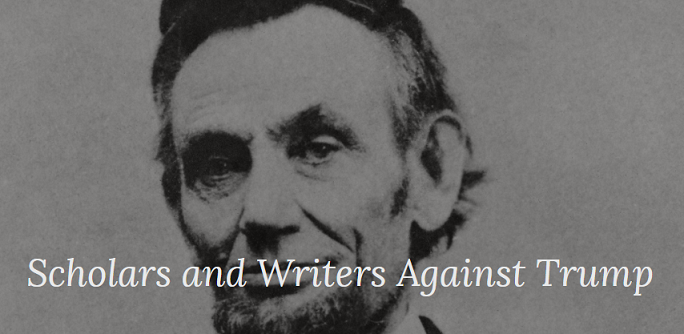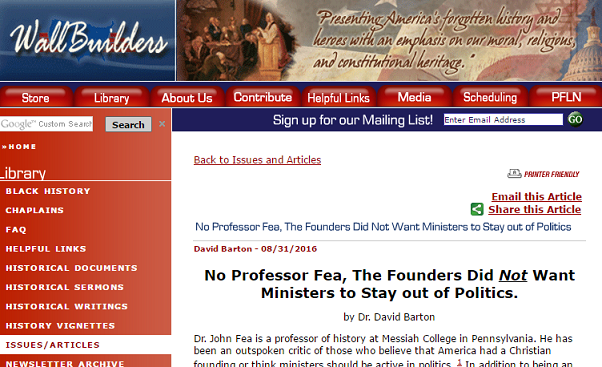A week ago at National Review Online, Victor Davis Hanson made a case that conservatives should vote for Donald Trump. Hanson is clearly my better when it comes to scholarship, but I wasn’t convinced by his essay. Provoked by his article, I have some questions for anyone who wants to defend the case for Trump with Hanson’s essay.
Why does Hanson minimize Donald Trump’s statements on the Access Hollywood audio?
Instead of saying Trump described sexual assault, Hanson said Trump “crudely talked about women” and displayed “crude sexual braggadocio.” All words. Not nice words, but words. However, eleven women have now come forward to say Trump did to them exactly what he claimed he did. Trump denies any bad action but given the actions specifically described on the audio, I have to wonder why Hanson didn’t mention this.
Hanson marshals Bill Clinton’s moral failings to suggest Trump should not be disqualified due to his moral failings. If I disqualified Trump solely based on his moral flaws then this might have some weight. However, as crude as Trump is, I feel he is disqualified for additional reasons.
Why does Hanson fail to fully describe how Trump is expanding the GOP via friendly overtures to white supremacists?
Hanson says Trump should be poised for victory in part because he has:
…apparently brought back to the Republican cause millions of the old Reagan Democrats, various tea-partiers, and the working classes
Although these groups are a part of Trump’s fans, Hanson doesn’t include the white supremacists in Trump’s coalition.
When it was discovered that then presidential hopeful Rand Paul hired a member of the League of the South for his campaign, the scandal was clear and the staffer was fired. When lowly Michael Peroutka sought a county commissioner’s seat, he had to drop out the League of the South to save his campaign. Now, the Trump campaign can invite white nationalists to campaign events and the Republican National Convention with nary a scratch. Trump has made the alt-right mainstream and this doesn’t even merit a mention in Hanson’s case for Trump, save for one reference to Trump being “insensitive” to minorities.
Why does Hanson fail to account for William Buckley’s prior writing on Trump?
Hanson invokes Buckley but fails to address Buckley’s own words on Trump. Trump has not changed much since Buckley wrote a column on the subject. Furthermore, Buckley wrote about the voter’s “quiet veto”:
In other ages, one paid court to the king. Now we pay court to the people. In the final analysis, just as the king might look down with terminal disdain upon a courtier whose hypocrisy repelled him, so we have no substitute for relying on the voter to exercise a quiet veto when it becomes more necessary to discourage cynical demagogy, than to advance free health for the kids. That can come later, in another venue; the resistance to a corrupting demagogy should take first priority.
I intend to use my quiet veto in keeping with Buckley’s advice.
How can Hanson be sure that Trump will bring to power competent conservatives who will actually have influence?
Hanson seems to think we can divorce a vote for Trump from the hypothesized benefit a Trump administration will bring.
The issue, then, at this late date is not necessarily Trump per se, but the fact that he will bring into power far more conservatives than would Hillary Clinton. No one has made a successful argument to challenge that reality.
Let there be no mistake, Eric Metaxas aside, a vote for Trump is a vote for Trump. We are not talking about a meek person. Trump has shown very little willingness to be coached. He has routinely undercut his running mate on matters of policy. He is for an idea as long as he thought of it, because as he says, he has a “very good brain.”
While I must concede that Trump might appoint a few good people, I don’t believe this possibility offsets the harm to conservative principles already done and potential additional harm of a Trump administration to those principles and to the nation.
Why is Hanson willing to declare Trump and Clinton equally corrupt without seeing Trump’s tax returns?
Hanson correctly lists Hillary’s offenses and implies they are worse than Trump’s. However, Hanson doesn’t address the fact that Trump has not released his tax returns nor does he call for it. Say what you want about the Clintons, one can trace their money more easily than one can do the same with Trump’s. It is incredible that Trump will complete his campaign without the release of his returns. The fact is Hanson doesn’t know as much about Trump as he does Clinton and he is fine with that.
Why is Hanson willing to give Trump a pass on his private sector failings and his contradictory policy declarations?
Not only does Hanson have a different standard with regard to Trump’s tax returns, he also advocates giving him a pass on his behavior as a businessman. Hanson writes:
We worry about what Citizen Trump did in the past in the private sector and fret more over what he might do as commander-in-chief. But these legitimate anxieties remain in the subjunctive mood; they are not facts in the indicative gleaned from Clinton’s long public record. As voters, we can only compare the respective Clinton and Trump published agendas on illegal immigration, taxes, regulation, defense spending, the Affordable Care Act, abortion, and other social issues to conclude that Trump’s platform is the far more conservative — and a rebuke of the last eight years.
This is perhaps the most perplexing portion of this case. If we cannot use Trump’s past to guide us, then what can we use? The platform? Trump’s statements? If so, which statements? The one where he said we should criminalize a woman for an abortion or the one where he said we shouldn’t? Should we believe, against all common sense and that nation’s stated policy, that Mexico will pay for the wall? Should we believe Trump when he said a single payer plan is a good idea or when he declares Obamacare is a disaster?
Why does Hanson talk Trump foreign policy risk without mentioning Russia?
It certainly appears that Trump has a thing for Putin. He seems to think Russia is helping with ISIS. Trump’s attitude toward Russia is troubling and worth at least some mention from someone trying to make a case that Trump is less dangerous than Clinton. I would want to have this be front and center in any case for Trump.
In fact, there was a significant difference between Trump and Clinton on Russia during the last debate. To me, Clinton seems to have the better read of what Russia is up to and I don’t think the U.S. should trust Russia in Syria or the Ukraine.
By the time I get to this question, it seems to me that one must minimize a lot of very important values to get to the case for Trump.


